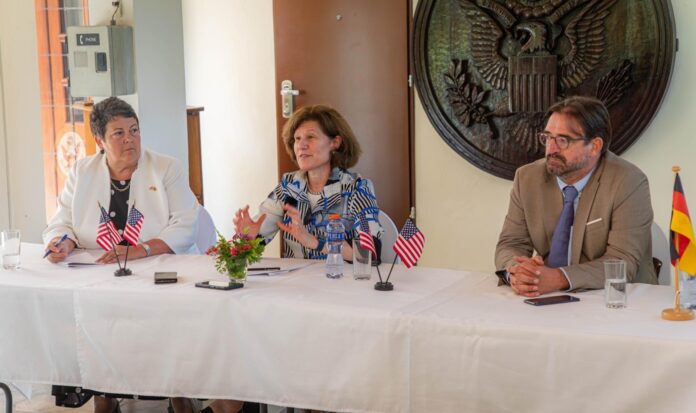
The United States and Germany, in partnership with the Government of Ghana, have launched a significant regional initiative aimed at enhancing security and preventing conflict in northern Ghana.
The Coastal States Stability Mechanism (CSSM), a US$40 million program, was lunched on October 10th with the goal of fostering stability in communities vulnerable to violent extremism and conflict, including areas along the coast of West Africa such as Benin and Togo.
This joint initiative aligns with Ghana’s National Framework for the Prevention and Countering of Violent Extremism and Terrorism. It emphasises the need for community-oriented approaches to address key instability drivers while mitigating the spread of violent extremist organizations (VEOs).
The CSSM program is expected to play a crucial role in promoting peace, social cohesion, and development in targeted regions.
U.S. Assistant Secretary of States for Conflict an Stabilisation Operation, Anne Witkowsky, during a press briefing following the launch, underscored the broader U.S. commitment to stability in West Africa, emphasizing that CSSM is an integral part of the U.S. Strategy to Prevent Conflict and Promote Stability (SPCPS).
“Through CSSM, we are pursuing an integrated approach to development and security, aligning our efforts with the plans of our partner governments,” she stated. “This holistic approach helps mitigate conflict risks, reduce vulnerabilities, and strengthen social cohesion.”
The initial phase of CSSM will fund critical infrastructure and services in the Chereponi District. These include the installation of 50 solar-powered streetlights in Wenchiki and Dambu communities, the provision of personal protective equipment for the police force, a back-up solar power system, and blood bank refrigerators for Chereponi District Hospital.
Additionally, the initiative will provide trauma counseling and peacebuilding programs aimed at fostering ethnic diversity, conflict resolution, and the promotion of community cohesion through high school debates and quiz competitions.
U.S. Ambassador to Ghana, Virginia Palmer, during a meeting with the press noted that the Coastal States Stability Mechanism (CSSM) is funded through the U.S. Agency for International Development (USAID) as part of a broader U.S. strategy to prevent conflict and promote stability across five key West African countries: Ghana, Togo, Benin, Cote d’Ivoire, and Guinea.
These nations face common threats stemming from instability in northern regions such as Mali, Burkina Faso, and Niger.
“This program seeks innovative and regional solutions that can be piloted, learned from, and applied across these countries. The CSSM initiative began in Togo and Benin earlier this year, and we are now launching it in Ghana with plans to expand into Cote d’Ivoire soon,” Mrs Palmer noted.
The United States Agency for International Development (USAID) and the German Federal Foreign Office have provided the initial funding for the CSSM program, which will be implemented by the International Organisation for Migration (IOM) in coordination with Ghana’s Ministry of National Security. The initiative also involves collaboration with local government institutions, community stakeholders, and the Counter Terrorism Fusion Center.
German’s Ambassador to Ghana, Daniel Krull, also highlighted the need to strengthen the presence of the Ghanaian state in remote border areas to enhance security.
He explained that Germany has supported this effort by assisting the Ghana Armed Forces, police, and Immigration Service in maintaining their capacities.
“Over the last two years, we have handed over a maintenance station in Tamale for the Immigration Service, with more support for the armed forces to follow,” Krull stated.
He also stressed the importance of building resilience in these areas to prevent conflict, noting that “prevention works best when all parts of society are included.”
Krull added that the CSSM initiative will focus on engaging women and marginalized communities in peace efforts.
CSSM’s scope will expand beyond Chereponi to support additional districts in Ghana’s Upper West and Upper East regions, tailoring programs to meet the specific security and development needs of each community. The initiative is designed to be flexible, allowing it to adapt to emerging challenges and empowering local communities to lead their own efforts toward long-term stability.
The formal launch, held in Yendi in Ghana’s Northern Region, saw the participation of top officials from both the U.S. and German governments. U.S. Assistant Secretary of State for Conflict and Stabilization Operations, Anne Witkowsky, and Germany’s Director General for Crisis Prevention, Stabilization, Peacebuilding, and Humanitarian Assistance, Deike Potzel, led the initiative, with Potzel addressing attendees remotely. They were joined by local authorities, including Chereponi District Chief Executive Hajia Zuweiratu Maddaa and Northern East Regional Minister Yidana Zakaria, who received equipment donated to support the region’s health and security sectors.
With this new joint effort, the United States, Germany, and Ghana are working together to enhance peace, security, and social development across northern Ghana, creating a model for regional cooperation in the fight against extremism and instability.









